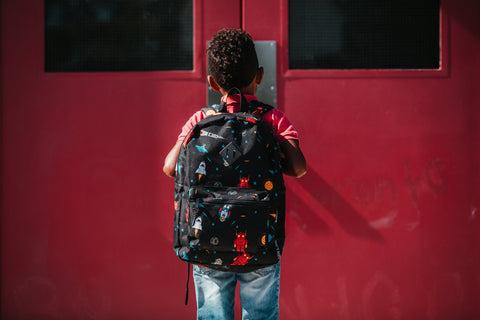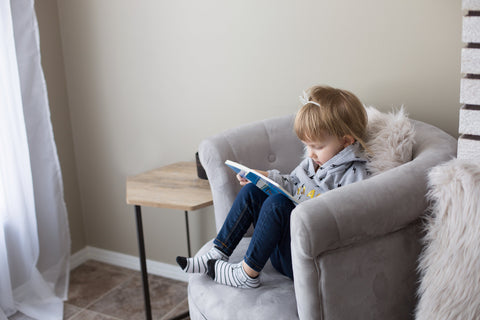It’s safe to say times are rough right now for just about everyone. Most of us have been shut in our homes since March. Many kids were just starting their Spring Break holiday when schools across the country decided to extend their holiday for a little while longer. Little did they know it would turn into a permanent vacation.
Now, as we approach the third month of social distancing inside our homes, your kids might be starting to feel what you might be feeling now. With so many parents out of work, unable to find work, bills piling up, and perhaps unable to provide enough food, the wear and tear of anxiety may be starting to spread to the rest of your family.
No one is expecting moms and dads to somehow be super parents and bury what they’re feeling. But it’s important to recognize that kids and teenagers are just tiny versions of yourself and all deal with anxiety and stress in different ways, ways you may not always recognize at first.
While this blog is geared towards helping kids and teens deal with stress, it’s important for you as a parent to take the time to deal with stress and anxiety. Take a break from your family and spend some alone time for a little while. Get outside for a while and get some sunshine when the weather is nice. Do something to help you take your mind off things even if only for a few minutes. By the far the most important thing you can do is turn off the news for a while and do anything else but see how the world is doing.
The Youngest Among Us
Elementary school aged kids likely have zero clue as to what’s going on right now. They’ve probably asked about a million and one questions as to why they haven’t been able to go to school, why they can’t see their friends, and why they’re spending so much time at home and not going places.
It’s easy to forget that even children as young as them can be susceptible to things like stress and anxiety. They may begin to show signs of behavior such as:
- Being more clingy
- Anxious
- Withdrawing
- Being angry or aggressive
- Being agitated
Experts agree the best thing for toddlers and younger children is to create a schedule and a routine for them so they have some structure. But just because they have a routine to follow, doesn’t mean you should force them to always stick to it. The same routine over and over can get boring for anyone, it’s not any different because they’re younger.
Creating routines doesn’t have to be rocket science. Essentially, set a schedule that makes sense for them to follow that includes times for learning, playtime, snacks, and naps. And always remember to be flexible. If they don’t feel like doing something on a particular day, find something new for them to do so that the routine doesn’t become such a chore. Spend extra time with them so they know that even though things are not exactly the same, they still feel safe and loved.
But most importantly, explain to them the current events in a way they’ll understand and why things will be different for a while.
Pre-Teens and Teens
Middle school aged kids likely don’t need an explanation about what’s going on in the world. They likely won’t even care because schools have them neck deep in online classes and school work.
Your young teen will likely feel the most stress of school. They’re sitting at a computer for hours a day and having to complete assignments mostly on their own without the regular help of their teacher or tutors. You as a parent may feel helpless because you’re simply not good at many things they’re learning.
There will likely be days when they simply just don’t want to work anymore. Even kids who are great at school may simply have their days when school is the last thing they want to be doing. They’re at an age where social interaction is a major part of their lives and being without their friends and not being able to go out and do things is likely putting a strain on their mental well being.
But while school is the last thing they want to be doing, the work still has to be done. And while you can’t do the work for them, offering your support and encouragement is the best thing a parent can do. Offer praise when they get assignments done or complete projects. Listen to them when they’re frustrated about something they’re not understanding and offer help when you can or help them reach out to a teacher to see if they can help out.
It’s also best to encourage them to practice good sleeping habits. This means going to bed at a reasonable time every night and avoiding using phones or tablets just before bedtime. This will help them feel refreshed when they wake up. Suggest making a schedule for the things they need to do work doesn’t pile up on them and so they feel like they still have structure in their lives just as they would if they were still going to school. And of course, make sure they schedule time to talk with friends and family on social media. It may not be the same as going out, but even a video chat with someone can help keep back the loneliness and social isolation they may be feeling.
Having to do classes at home is the equivalent of working from home for your teen. They’re having to adjust to it just like you are and spending hours learning on a computer just isn’t for everyone.
High School Teens and Young Adults
Senior year of high school is supposed to be one of the biggest times in your teen’s life. Filling out college applications, scholarships, going to prom, getting accepted into their dream school and being well on their way to becoming adults.
Then, along comes a global pandemic and their whole world comes crashing down. No prom, no dances, no games to watch, no parties to go to, not even a mall to hang out in is open. Their vision for what they hoped senior year would be is completely ruined and chances are, many of them aren’t taking it very well. It’s not surprising that depression among teens is on the rise.
Remember the days when you were their age. More than likely, you already had your own life and spent more time out with your friends and at school than you ever did at home. Your late teens is when you start distancing yourself from your family and start being your own person and surrounding yourself with people whom you can relate to. But imagine having all that taken away and the world suddenly being very different in the blink of an eye.
Your high school teen is now trapped at home, likely stuck on a computer having to work on assignments for hours at a time. Being social is no longer an option and for an extroverted teen who loves being around people and has a massive group of friends, home is the last place they want to be.
For a lot of teens, friends aren’t just people to hang out with on a Friday night. For them, friends can be an emotional support group for the things they feel they can’t talk about with their family. Taking away an emotional safety net from anyone can be damaging. Add on the stresses of school and having to help around the house more and having almost no privacy, and it’s a perfect storm for depression and anxiety.
Some common signs you might notice from your teen who isn’t coping well:
- Being more agitated
- Withdrawing and spending more time alone in their bedrooms
- Not eating normally or at all.
- Losing interest in hobbies or other things they enjoy doing.
- Not sleeping well
- Lack of focus
Depression is not an easy problem to overcome. Anyone who has suffered from it knows the emotions you’re feeling while depressed are far stronger than words of reason from people who love and care about you. But while that may be so, parents shouldn’t simply stand back and let their teens become reclusive and withdrawn from life simply because of what is happening.
Talking with your teen about what’s going on and how they’re feeling is incredibly important. They need to be reminded that while things look bad now, they won’t always be this way. Encourage them to make vacation plans with friends and make up for lost time when things slowly get back to normal. Suggest spending time with friends either via video conference, video games, or even just talking to a friend on the phone while doing things like walking the dog, taking a walk, or simply sitting outside and getting some sunshine.
It’s also important to encourage them to keep planning for the things they were already planning to do. This could be picking a college, deciding what to study, filling out scholarship applications, picking clubs they want to join, or even planning that graduation road trip with friends to celebrate finishing high school. Your teen needs to know that there will still be plenty of life to live once this pandemic is over. And while things may not go back to normal instantly, life will start becoming something more recognizable sooner than they think. They’ll need to make sure they’re still on top of things and making sure they’re staying closely connected with friends so they don’t lose that emotional safety net they’ve worked so hard to create.
Above all else, give them hope. Things will not always be this way. Things will get better with time.
Helpful Links
If you, a family member, or a friend is dealing with depression or suicide, please call the National Suicide Prevention Hotline at 1-800-273-8255.
For more information on how you and your family can cope with the stress of anxiety and depression, please check out the websites below:
- https://suicidepreventionlifeline.org/current-events/supporting-your-emotional-well-being-during-the-covid-19-outbreak/
- https://www.who.int/docs/default-source/coronaviruse/helping-children-cope-with-stress-print.pdf?sfvrsn=f3a063ff_2
- https://www.healthline.com/health-news/how-to-help-kids-cope-with-covid-stress
- https://www.childrens.com/health-wellness/8-tips-for-managing-childrens-anxiety-about-covid-19
- https://uichildrens.org/health-library/managing-stress-during-coronavirus-covid-19-outbreak
- https://adaa.org/learn-from-us/from-the-experts/blog-posts/consumer/covid-19-lockdown-guide-how-manage-anxiety-and
- https://www.mayoclinic.org/diseases-conditions/coronavirus/in-depth/mental-health-covid-19/art-20482731
- https://www.hhs.gov/coronavirus/mental-health-and-coping/index.html




Comments (0)
There are no comments for this article. Be the first one to leave a message!